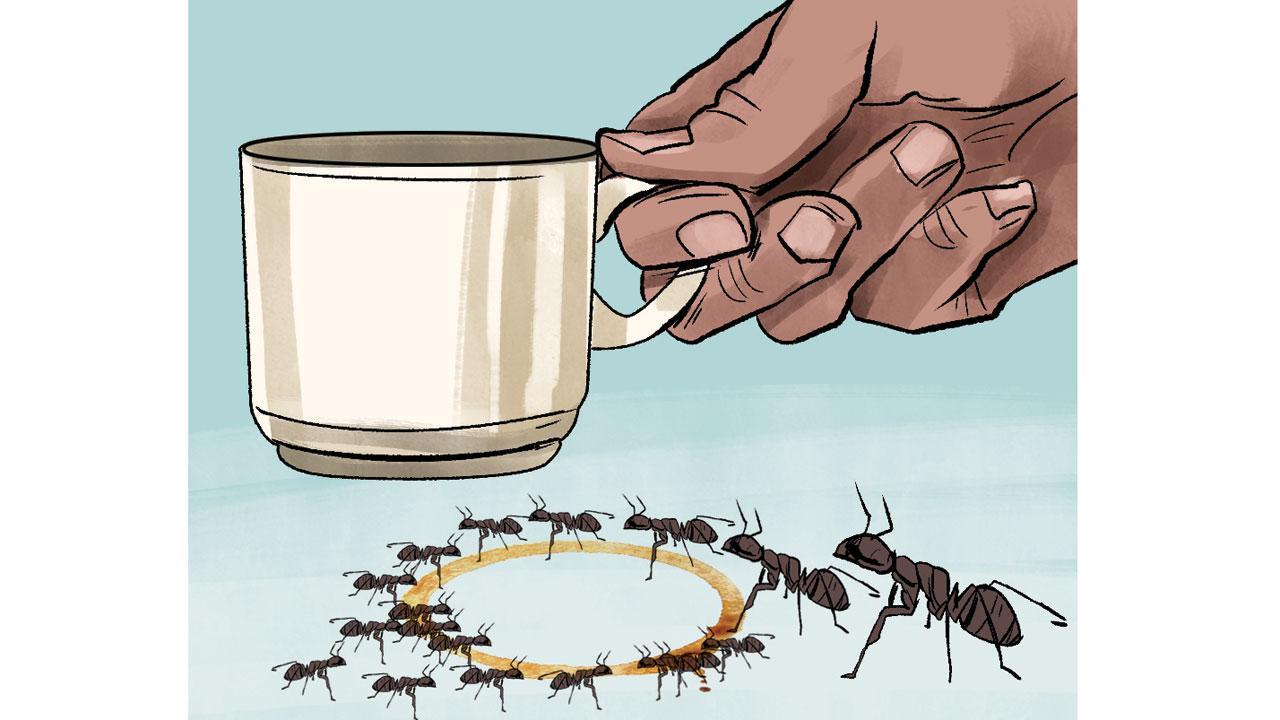As soon as you lift your chai cup from the verandah wall, a queue of black ants assembles in seconds, to greedily lap up from the brown circle left behind by your cup

Illustration/Uday Mohite
One of the few terrific things about COVID-19 is the opportunity—and obligation—to slow down your life. Last month, I was very fortunate to spend 10 days being dead still, in a cottage set in a gorgeous fruit orchard outside Bombay. I spent an entire afternoon lazily watching mangoes ripen on trees, with an indulgent smile. The branches were so laden with mangoes, they could barely look up to return my smile.
ADVERTISEMENT
As soon as you lift your chai cup from the verandah wall, a queue of black ants assembles in seconds, to greedily lap up from the brown circle left behind by your cup. You can imagine them complaining they had asked for tea with sugar. What do you mean you take tea without sugar, harrumph! Appalling service. It’s been long since I thought about ants and whether they’re getting enough to eat. During our school holidays in Dharwar, my “native place”, I saw my grandmother make rangolis every dawn in the courtyard, from rice flour, so the ants could eat something too.
The 15-acre private property I visited is off the main road, and very quiet. The cottage is thickly surrounded by mango, jackfruit, banana, cashew, coconut and chickoo trees. At the entrance to the cottage, is a carambol tree, laden with golden yellow fruit. Again, not since childhood have I stood under a tree with a bedsheet, while the neighbour knocked bunches of the fruit with a long stick, and we ran this way and that, to catch the fruit in the sheet, before they juicily plopped to the ground, pa-chakk. Some we just gobbled up immediately, scrunching up our eyes at its khattaness. When we sliced the remainder and put them in a salad, they made jaunty bright yellow star-shapes, a sheer delight.
Directly behind the cottage are veggie fields, with bhindi (okra, ladies’ finger), brinjal (eggplant), tomatoes, ridge gourd, bitter gourd, chillies, and more. When I go for morning walks, the air is still crisp, and the air is filled with the sweet songs of several birds I don’t recognise. I’ve seen the magpie robin, sun bird, bulbul, bee eater and crow pheasant (Bharadwaj) here. There are enormous ancient, four-storey high mango and tamarind trees, with gnarled wooden trunks, in which squirrels tuck away their babies and edible treasures. In the afternoon I met a squirrel who was sitting upright on her hind legs, and gobbling a chickoo with her two “hands”. She looked adorable, a squirrel who was spoilt for choice.
In two days, my body felt so relaxed, I felt a lot lighter, as all the stress had oozed out. Bed tea comes at 6.30 am. So I’m cheerfully up and about by 7 am, and fast asleep by 10.30 pm, something I haven’t managed in Bombay in decades. The weather is so nice, I go for a long morning walk in the fields and walkways. There’s a most beautiful temple here as well. I’m not really a temple person—I’m more spiritually inclined—but this temple is so quiet and clean, I’m happy to visit it every morning. As you do the pradakshina, you admire its beautiful black stone sculptures of Ram, Vitthal, Ganesh, Lakshmi, Vishnu, Saraswati and more. There is something beautiful about gods getting cleaned, fresh homemade garlands of hibiscus, tagar, roses and aboli from the garden put around them, and lamps being lit. Saraswati’s fingers delicately play her veena and you think, you really like this goddess.
Meenakshi Shedde is India and South Asia Delegate to the Berlin International Film Festival, National Award-winning critic, curator to festivals worldwide and journalist. Reach her at meenakshi.shedde@mid-day.com
 Subscribe today by clicking the link and stay updated with the latest news!" Click here!
Subscribe today by clicking the link and stay updated with the latest news!" Click here!







